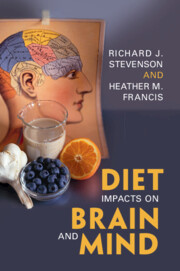Book contents
- Diet Impacts on Brain and Mind
- Diet Impacts on Brain and Mind
- Copyright page
- Contents
- Figures
- Tables
- Preface and Acknowledgements
- Chapter 1 Introduction
- Chapter 2 Pregnancy, Infancy and Development
- Chapter 3 Acute Effects of Food Intake
- Chapter 4 Chronic Effects of Food Intake
- Chapter 5 Dietary Neurotoxins
- Chapter 6 Neuroprotective Effects of Diet
- Chapter 7 Food-Related Drugs and Food as a Drug
- Chapter 8 Starvation and Caloric Restriction in Adults
- Chapter 9 Essential Nutrient Deficiencies in Adults
- Chapter 10 Implications and Conclusions
- References
- Index
Chapter 10 - Implications and Conclusions
Published online by Cambridge University Press: 02 February 2023
- Diet Impacts on Brain and Mind
- Diet Impacts on Brain and Mind
- Copyright page
- Contents
- Figures
- Tables
- Preface and Acknowledgements
- Chapter 1 Introduction
- Chapter 2 Pregnancy, Infancy and Development
- Chapter 3 Acute Effects of Food Intake
- Chapter 4 Chronic Effects of Food Intake
- Chapter 5 Dietary Neurotoxins
- Chapter 6 Neuroprotective Effects of Diet
- Chapter 7 Food-Related Drugs and Food as a Drug
- Chapter 8 Starvation and Caloric Restriction in Adults
- Chapter 9 Essential Nutrient Deficiencies in Adults
- Chapter 10 Implications and Conclusions
- References
- Index
Summary
This chapter examines the implications arising from the book’s content, and draws some general conclusions. Section 10.2 considers implications on a chapter-by-chapter basis, covering the small effect of breastfeeding on cognition, the nature of energy metabolism in the brain, dietary components versus patterns, the gut–brain axis, caffeine and sugar, immorality and hunger, lifespan extension and depression as a common consequence of nutritional deficiency. Section 10.3 presents conclusions and future directions, organised under three headings. First, the necessity to improve dietary recording methods, examining biomarkers for individual foods, active and passive food image collection, and monitoring eating. Second, nutraceutical and nutrigenomics, with the former’s failure so far to deliver concrete benefits – and why – and the latter’s potential to explain this through understanding individual differences. Third, the translation and reproducibility crises in biomedicine, and some consideration of their solutions as they apply here.
Keywords
Information
- Type
- Chapter
- Information
- Diet Impacts on Brain and Mind , pp. 356 - 372Publisher: Cambridge University PressPrint publication year: 2023
